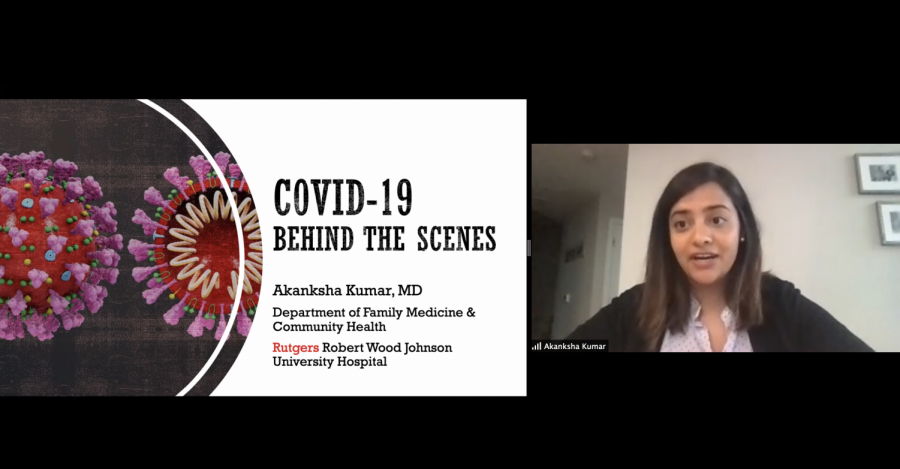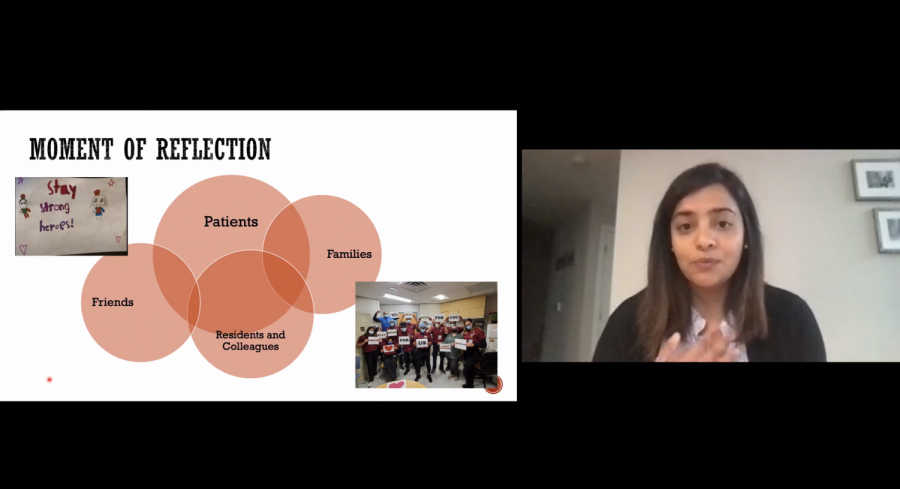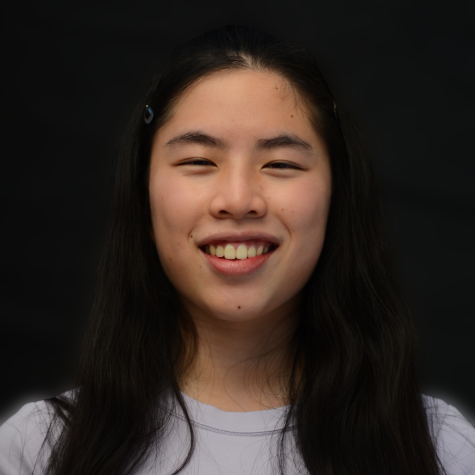New Jersey doctor speaks to Harker community about working on front lines of COVID-19 pandemic
Dr. Akanksha Kumar used slides as a part of her talk about her experiences working on a COVID-19 team. She is a family medicine physician at the Robert Wood Johnson University Hospital in New Jersey.
May 10, 2020
Family medicine physician Dr. Akanksha Kumar spoke to 63 Harker students and faculty via Zoom during long lunch on Friday about her experience working on a COVID-19 team at the Robert Wood Johnson University Hospital in New Jersey.
With this speaker event, organized by Riyaa Randhawa (10), Dr. Kumar was able to share challenges that many members of the medical industry are enduring right now and spread a message of hope to the upper school.
The Robert Wood Hospital has taken care of at least 893 COVID-19 patients, 596 of whom have recovered. Like many around the world, the hospital experienced shortages of resources due to the pandemic.
“It’s easy to think that we would just have enough for all these patients, but you don’t anticipate having as much of a need,” Dr. Kumar said. “You don’t anticipate that almost every patient that now starts to walk through the hospital doors is going to need some kind of respiratory support. So it’s not surprising that we ran out of equipment.”
Besides a scarcity of respiratory equipment like ventilators, the hospital staff also dealt with a drastic shortage of personal protective equipment. Dr. Kumar and her team members wore the same N-95 mask on 12-hour shifts for seven days. The CDC recommends that an N-95 mask should be worn no longer than eight hours.
There were also gown shortages. The last time Dr. Kumar was on the COVID-19 shift, she and her team were told to start collecting trash bags to use as gowns.
But the difficulties of the pandemic extend beyond supply shortages for those working in health care, as the coronavirus has forced many medical professionals to stay away from their loved ones. When Dr. Kumar knew that she would be exposed to coronavirus patients, she immediately thought about her family.
“My first thought was, ‘Okay, so nobody can be at my house with me. I have to make sure that everybody is shipped off somewhere and safe because I don’t want to expose anyone inadvertently by bringing something home,’” Dr. Kumar said.
As part of the team that runs the residency program at Rutgers New Jersey Medical School, she also thought about her residents, many of whom live with older family members. To prevent infection, college housing dorms were opened for health care workers in the COVID-19 teams.
As a result of the exhaustion from long shift hours and the grief of losing patients and colleagues, the coronavirus has taken a significant toll on health care professionals.
To cope with the situation, Dr. Kumar finds strength in working together with her team members.
“There’s always a silver lining. There’s a humanity aspect of this that I think has been what keeps me going most days,” she said. “If I didn’t have my colleagues and people that were in it with me, it would be hard to keep going.”
Going forward, Dr. Kumar believes that the development of a vaccine would be the most promising step towards treating COVID-19. Hospitals are already running clinical trials and giving patients drugs like remdesivir, an antiviral medication that may be effective against coronavirus.
At the end of the presentation, science department chair Anita Chetty thanked her for sharing her perspective and for serving as a doctor during a pandemic.
“[Dr. Kumar is] incredibly courageous and such an inspiration to our students,” Chetty said.
Sophomore Alina Yuan expressed similar sentiments.
“Hearing Dr. Kumar talk put things in perspective for me, and I found the talk interesting and eye-opening,” Alina said. “Something that stood out to me was when she talked about the lack of supplies and the measures that the health care professionals took to conserve their equipment.”


















![“[Building nerf blasters] became this outlet of creativity for me that hasn't been matched by anything else. The process [of] making a build complete to your desire is such a painstakingly difficult process, but I've had to learn from [the skills needed from] soldering to proper painting. There's so many different options for everything, if you think about it, it exists. The best part is [that] if it doesn't exist, you can build it yourself," Ishaan Parate said.](https://harkeraquila.com/wp-content/uploads/2022/08/DSC_8149-900x604.jpg)




![“When I came into high school, I was ready to be a follower. But DECA was a game changer for me. It helped me overcome my fear of public speaking, and it's played such a major role in who I've become today. To be able to successfully lead a chapter of 150 students, an officer team and be one of the upperclassmen I once really admired is something I'm [really] proud of,” Anvitha Tummala ('21) said.](https://harkeraquila.com/wp-content/uploads/2021/07/Screen-Shot-2021-07-25-at-9.50.05-AM-900x594.png)







![“I think getting up in the morning and having a sense of purpose [is exciting]. I think without a certain amount of drive, life is kind of obsolete and mundane, and I think having that every single day is what makes each day unique and kind of makes life exciting,” Neymika Jain (12) said.](https://harkeraquila.com/wp-content/uploads/2017/06/Screen-Shot-2017-06-03-at-4.54.16-PM.png)








![“My slogan is ‘slow feet, don’t eat, and I’m hungry.’ You need to run fast to get where you are–you aren't going to get those championships if you aren't fast,” Angel Cervantes (12) said. “I want to do well in school on my tests and in track and win championships for my team. I live by that, [and] I can do that anywhere: in the classroom or on the field.”](https://harkeraquila.com/wp-content/uploads/2018/06/DSC5146-900x601.jpg)
![“[Volleyball has] taught me how to fall correctly, and another thing it taught is that you don’t have to be the best at something to be good at it. If you just hit the ball in a smart way, then it still scores points and you’re good at it. You could be a background player and still make a much bigger impact on the team than you would think,” Anya Gert (’20) said.](https://harkeraquila.com/wp-content/uploads/2020/06/AnnaGert_JinTuan_HoHPhotoEdited-600x900.jpeg)

![“I'm not nearly there yet, but [my confidence has] definitely been getting better since I was pretty shy and timid coming into Harker my freshman year. I know that there's a lot of people that are really confident in what they do, and I really admire them. Everyone's so driven and that has really pushed me to kind of try to find my own place in high school and be more confident,” Alyssa Huang (’20) said.](https://harkeraquila.com/wp-content/uploads/2020/06/AlyssaHuang_EmilyChen_HoHPhoto-900x749.jpeg)











